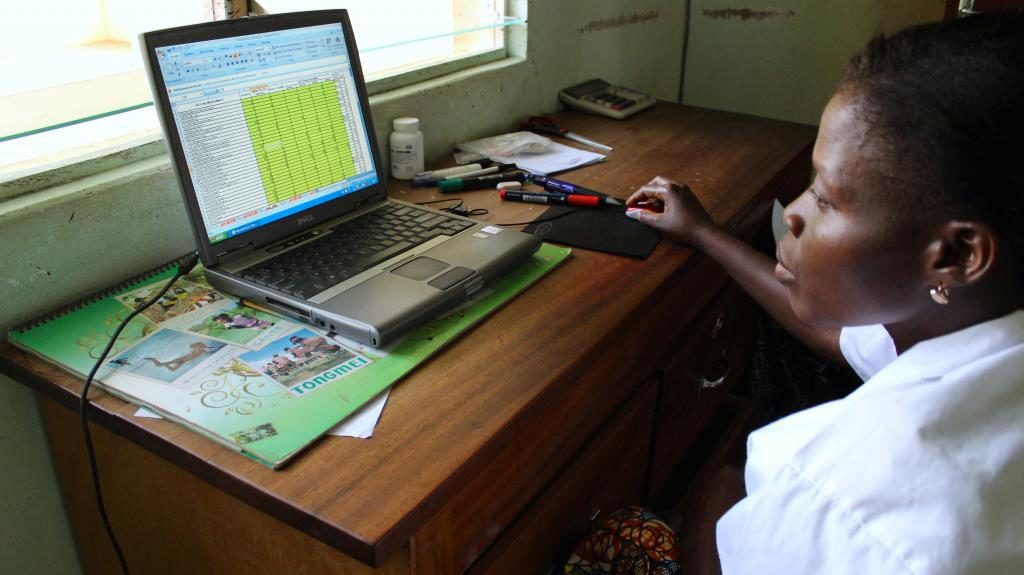Mazabalo Bilim began working for Integrate Health as a Clinical Nurse in 2015. In 2018, he was promoted to Clinical Mentor of the Bassar District. As a Clinical Mentor in the Integrated Primary Care Program, Mazabalo wears many hats in the health centers that he supervises. Among them, Mazabalo sees his role as a “continuous coach” for healthcare providers. He guides them on how to abide by clinical protocols as a way to continuously improve the quality of care they provide to their patients. Mazabalo also creates strong relationships with the providers, giving them instruction when he knows that there is room for improvement.

One example of how Mazabalo acts as a “continuous coach” was when he recently worked closely with a trained birth attendant to teach her how to fill out a Partogram (a tool used by healthcare providers to monitor pregnancy). After working with her continuously for months, she was able to fill out the tool with ease and confidence. The trained birth attendant said to Mazabalo, “I used to think it was necessary to go to midwifery school to know the Partogram, but because you taught me, I now can do it too.” “Experiences like these,” Mazabalo said, “are the reason why I feel proud to be a Clinical Mentor.”
In Togo, health worker density is only .6 personnel per 1,000 inhabitants according to the National Health Financing Strategy.1 Togo falls well below the target density recommended by the World Health Organization of 2.3 per 1,000 inhabitants1. Additionally, of the physicians working in Togo, 75% are concentrated in the capital city, Lomé, hours from the northern, rural regions1. This gap in human resources has severe consequences for maternal and child health, making it necessary to ensure that high-quality healthcare is delivered across the country while health staffing increases.
How does Integrate Health build clinical capacity to improve healthcare delivery?
Integrate Health employs trained nurses or midwives with public sector clinical experience to serve as Clinical Mentors to Integrate Health-supported health centers. Clinical Mentors provide weekly support to improve the quality of care delivered in health centers to patients and general management of the health center. Additionally, the Clinical Mentors provide coaching for nurses and midwives to ensure that they are abiding by national and international protocols regarding diagnostics, classification and treatment of disease for infants and pregnant women, and recordkeeping.

What type of training do Clinical Mentors receive?
Clinical Mentors receive training on supervision techniques to provide coaching support for nurses, midwives, trained birth attendants, and pharmacy managers.
In line with national and international guidelines, and developed in collaboration with the Ministry of Health, the training includes modules on maternal health; reproductive, neonatal, and infant health; and HIV. Additionally, Clinical Mentors are trained in decision-making and supply chain management tools.
What is the workload for Clinical Mentors?
Clinical Mentors rotate between a group of four to seven clinics, spending four days per week in the field coaching nurses and midwives. They serve to reinforce the Togolese Ministry of Health District Health Management supervisory team. Clinical Mentors participate in monthly review meetings of the District Health Management team and serve as a critical communication link between the health centers and the District Health Director. Clinical Mentors also receive weekly supervision from an Integrate Health teaching clinician who has experience working in the public sector.
How does Integrate Health work with Clinical Mentors to continuously improve the quality of the delivery of health services?
Integrate Health is a “continuous learning” organization, meaning that every data point we collect, we use to improve the quality of care that is delivered to patients. Clinical Mentors play a vital role in improving the quality of care as they are the direct link between the Integrate Health staff and the healthcare providers. When Integrate Health’s Monitoring, Evaluation, and Quality Improvement team examine the data and identify a problem, such as decreased attendance at prenatal consultations, they collaborate with the program team and the Clinical Mentors to understand the challenges and implement a solution to improve the issue.
How does clinical capacity-building impact the broader health system?
Integrate Health’s capacity-building approach provides a model for health systems to strengthen the coordination and the delivery of healthcare even in rural communities. While the Clinical Mentor receives a salary that is currently paid by Integrate Health, the Clinical Mentor serves an important supervision function that the Ministry of Health is currently unable to fulfill. Ultimately, Integrate Health is working with the Ministry of Health to explore how Clinical Mentors could be formally added to the District Management team of the Ministry of Health over the long term.
1National Health Financing Strategy for Universal Health Coverage 2019-2030, Ministry of Health and Social Protection, Togo
